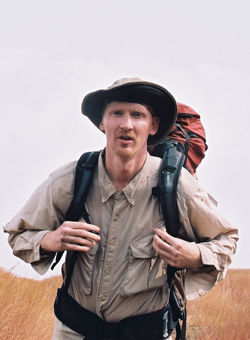Professor
About
Find Me On:
twitterRole:
FacultyPosition:
- Professor
Concentration:
- Cultural Anthropology
Department:
- Anthropology and Geography
Education:
- Ph.D. in Anthropology, University of California, San Diego, California, 1997 M.A. in Anthropology, University of California, San Diego, California, 1990 B.S. in Molecular Biology, Vanderbilt University, Nashville, Tennessee, 1988
Curriculum Vitae:
Biography
Professor, Department of Anthropology and Geography
Additional Appointments:
Adjunct Professor, Colorado School of Public Health
Advising Faculty Member, Graduate Degree Program in Ecology
I am a psychological and biocultural anthropologist who aims to understand the cultural foundations of stress-related well-being processes. My interests include how sacred and secular forms of play contribute to human flourishing, including in situations of social and environmental precarity. I also focus on "ethnopsychiatry," in the sense of cross-cultural comparative approaches to the diagnosis, treatment, and prevention of mental disorders. These topics feature centrally in my recent book, The Avatar Faculty: Ecstatic Transformations in Religion and Video Games (University of California Press, 2023). I specialize in research methods and pragmatically mix qualitative and quantitative approaches to data collection and analysis in my ethnographic studies, sometimes turning to biomarkers to illuminate how stress manifests in the mind and body. You can read more about these approaches in my book, Systematic Methods for Analyzing Culture: A Practical Guide (Routledge, 2021). Most recently, I'm developing ethnographic methods to identify and clarify causal processes, with a 2024 PLOS ONE article on that topic, Causal Inference in Ethnographic Research.
Details on my research can be found on my profiles on ResearchGate and Google Scholar.
Prospective MA and PhD students should consult my ResearchGate and Google Scholar profiles to see if their interests align with my own. Applicants should be ready to employ a range of qualitative and quantitative approaches to ethnographic research and demonstrate relevant skills and background to accomplish that.
Research
Dir., Ethnographic Research and Teaching Laboratory (ERTL); human flourishing; culture & stress; sacred/secular play & well-being; ethnopsychiatry; pragmatic mixed methods; causality.
Courses
-
ANTH 322, Anthropology of Religion (undergrad)
SyllabusThis course will train students to analyze religions as cultural and psychosocial phenomena. We will be primarily concerned with religious traditions referred to variously as primal, tribal, indigenous, animistic, and shamanistic. However, we will also consider case studies from the major world religions, and especially as the beliefs, values, and institutions of such religions are reformulated in folk or popular consciousness. In all cases, as anthropologists, we will be more interested in actual religious practices rather than in the textual or orthodox doctrines of these religions, though the latter can also importantly inform religious thought and practice.
-
ANTH 445, Psychological Anthropology (undergrad)
SyllabusThis course introduces students to psychological anthropology—a subfield of cultural anthropology that focuses on the interrelationship of culture and mind. It will be argued that consideration of sociocultural processes, as well as cross-cultural research in general, allow for fuller accounts of mental and psychological processes. Likewise, it will be suggested that attention to the individual mind—and thus to psychology broadly conceived—enriches the anthropological project. Students will also learn psychological anthropological research methods by reading about, discussing, and practicing those methods. Overall, the course will develop an “individual in sociocultural context” framework in order to deepen students’ appreciation of the manner that culture and mind mutually inform and constitute each other, and also the way self and personal identity vary cross-culturally.
-
ANTH 506, Anthropology of Happiness and the Good Life (grad)
SyllabusThe course draws on anthropological and interdisciplinary perspectives to illuminate the sociocultural and evolutionary basis of human happiness and flourishing. Topics include: anthropological approaches to value, morality, and social norms; economic, environmental, and social determinants of happiness; sources of human resilience, including religion and play; emotions and subjective well-being; biological and health correlates of happiness.
-
ANTH 543, Foundations of Ethnographic Research (grad)
SyllabusIn this seminar, students explore ethnographic research methods used in cultural anthropology and in the social and behavioral sciences more generally. In addition to critical consideration of course texts, students pursue hands-on methodological exercises that are meant to enhance understanding of key topics. Students also prepare a draft of a research grant related to their current interests. The class promotes the idea that attention to theory, careful research design, and thoughtful data collection and analysis strategies can produce research that provides rich insights into human experience as shaped by culture. Course concepts and techniques are demonstrated via class activities, discussions, and exercises on actual data, including some collected by students themselves.
-
ANTH 444, Cultures of Virtual Worlds: Research Methods (undergrad)
SyllabusIn this seminar, students learn cultural anthropological research methods by reading about, discussing, and practicing those methods in their own research projects. In the past, students have investigated topics such as esports, gaming guilds, trolling, Hinduism on the internet (during the pandemic), streaming culture (Twitch etc.), Facebook medical support groups, online fandom, internet memes and urban myths (related to, for ex., Slender Man), Instagram culture (in one case, related to female surfers and rock-climbers), Second Life, and much more. Students often study an internet reality or virtual world that they know something about or instead choose to delve into an internet reality or virtual world more foreign to them. Whatever the choice, student research will be documented in ethnographic fieldnotes, interview transcripts, field surveys, and the like, which will provide the basis for the class’s activities, assignments, and discussions. Through their research, students will learn how to link theory and method in a practical and collaborative research setting.
